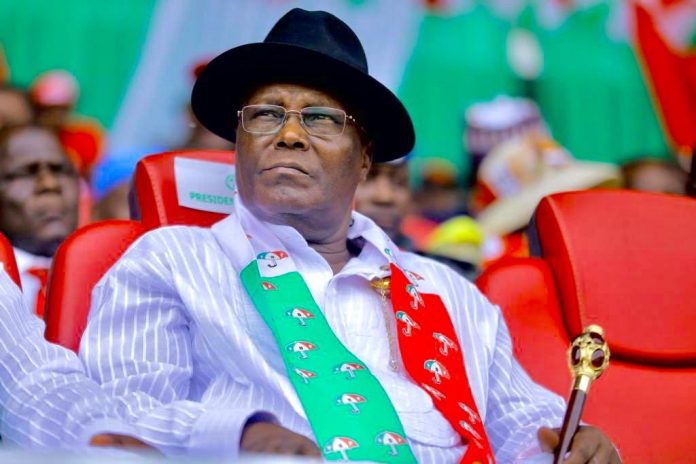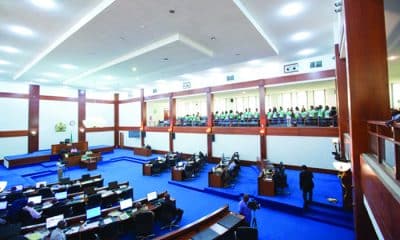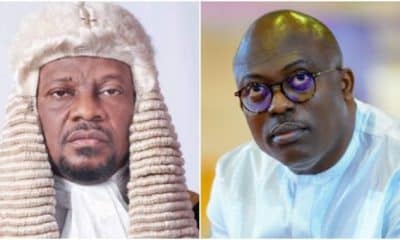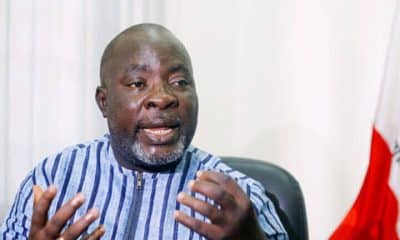Nigeria News
Atiku Is Not A Nigerian, Not Fit To Run For President, Malami Tells Court

The Attorney-General of the Federation (AGF) and Minister of Justice, Abubakar Malami, has told a Federal High court in Abuja that Atiku Abubakar is not eligible to contest for president in Nigeria.
Naija News reports that Atiku Abubakar is the former vice president of Nigeria, a former presidential aspirant of the All Progressives Congress (APC), and the 2019 presidential candidate of the Peoples Democratic Party (PDP).
In an affidavit in support of a suit marked FHC/ABJ/CS/177/2019 and filed before the court by the Incorporated Trustees of Egalitarian Mission for Africa (EMA), Malami said Atiku is not qualified to be the president because he is not a Nigerian by birth.
In 2019, the EMA instituted the suit challenging Atiku’s eligibility to contest for president.
They asked the court to hold among others, that considering the provisions of sections 25(1) &(2) and 131(a) of the constitution and the circumstances surrounding his birth, the former vice-president cannot contest for the top office.
The AGF through his legal team led by Oladipo Okpeseyi agreed that Atiku is not a Nigerian citizen by birth.
“The first defendant (Atiku) is not qualified to contest to be president of the federal republic of Nigeria,” Malami submitted.
“The first defendant is not a fit and proper person to be a candidate for election to the office of president of the federal republic of Nigeria.
“The first defendant was born on the 25th of November, 1946 at Jada, at the time in Northern Cameroon. By the plebiscite of 1961, the town of Jada was incorporated into Nigeria.
“The first defendant is a Nigerian by virtue of the 1961 plebiscite, but not a Nigerian by birth. The first defendant’s parents died before the 1961 plebiscite.”
Malami said the effect of the June 1, 1961 plebiscite was to have the people of Northern Cameroon integrated into Nigeria as new citizens of the country, even after Nigeria’s independence.
“This qualified all those born before the 1961 plebiscIte as citizens of Nigeria, but not Nigerian citizen by birth. Consequently, only citizens born after the 1961 plebiscite are citizens of Nigeria by birth,” he added.
Citing the provisions of 1960, 1963, 1979 and 1999 constitutions Malami said the “reasoning of the lawmakers in ensuring that the persons to be the president of Nigeria is a citizen of Nigeria by birth is because such a person is the number one citizen and the image of the Nigerian state”.
“This is even more so where his parents do not belong to any tribe indigenous to Nigeria until their death,” he said.
“The facts of his (Atiku’s) birth on the Cameroonian territory to Cameroonian parents remain unchallenged.
“At best, the first defendant can only acquire Nigerian citizenship by the 1961 plebiscite. The citizenship qualifications under Section 26 and 27 of the 1999 Constitution of the Federal Republic of Nigeria (1999), by implication, have limited the first defendant’s privileges or rights and cannot be equal or proportional to the privileges of other citizens who acquire their citizenship status by birth.
“This would include the legal preclusion of the first defendant from contesting for the office of the President of Nigeria.
“If either his parents had become Nigerian citizen by virtue of Section 25(1) of the 1999 Constitution, which must be in compliance with Sections 26 and 27of the same constitution.
“With no concrete proof of compliance, we submit that the first defendant cannot contest election to the office of the Nigerian President.”
Malami said Atiku committed an offence under section 118(1)(k) of the Electoral Act when he contested and won the office of the vice-president in 1999.
However, Atiku and the Peoples Democratic Party (PDP) on which platform he contested the last election have asked the court to dismiss the suit for lacking in merit.
In their notice of objection filed jointly, they insisted that Atiku is “a bonafide citizen of the federal republic of Nigeria”.
Atiku also said besides serving as Nigeria’s vice-president from 1999 to 2007, he held many public and private offices, including serving as governor of Adamawa state and was a commissioned officer of the Nigerian Customs Service.
He said his parents, grandparents and great grandparents were born in Nigeria and they lived, died as Nigerians, and were buried in Nigeria.
The former vice president told the court that the suit was filed in bad faith in an attempt to malign his person and integrity.
Atiku also objected to the plaintiff’s right to challenge his nationality, arguing that it failed to show the interest it has above other citizens of Nigeria to be entitled to approach the court on the issue.
However, the presiding judge, Justice Inyang Ekwo, fixed May 4 to hear the suit.












